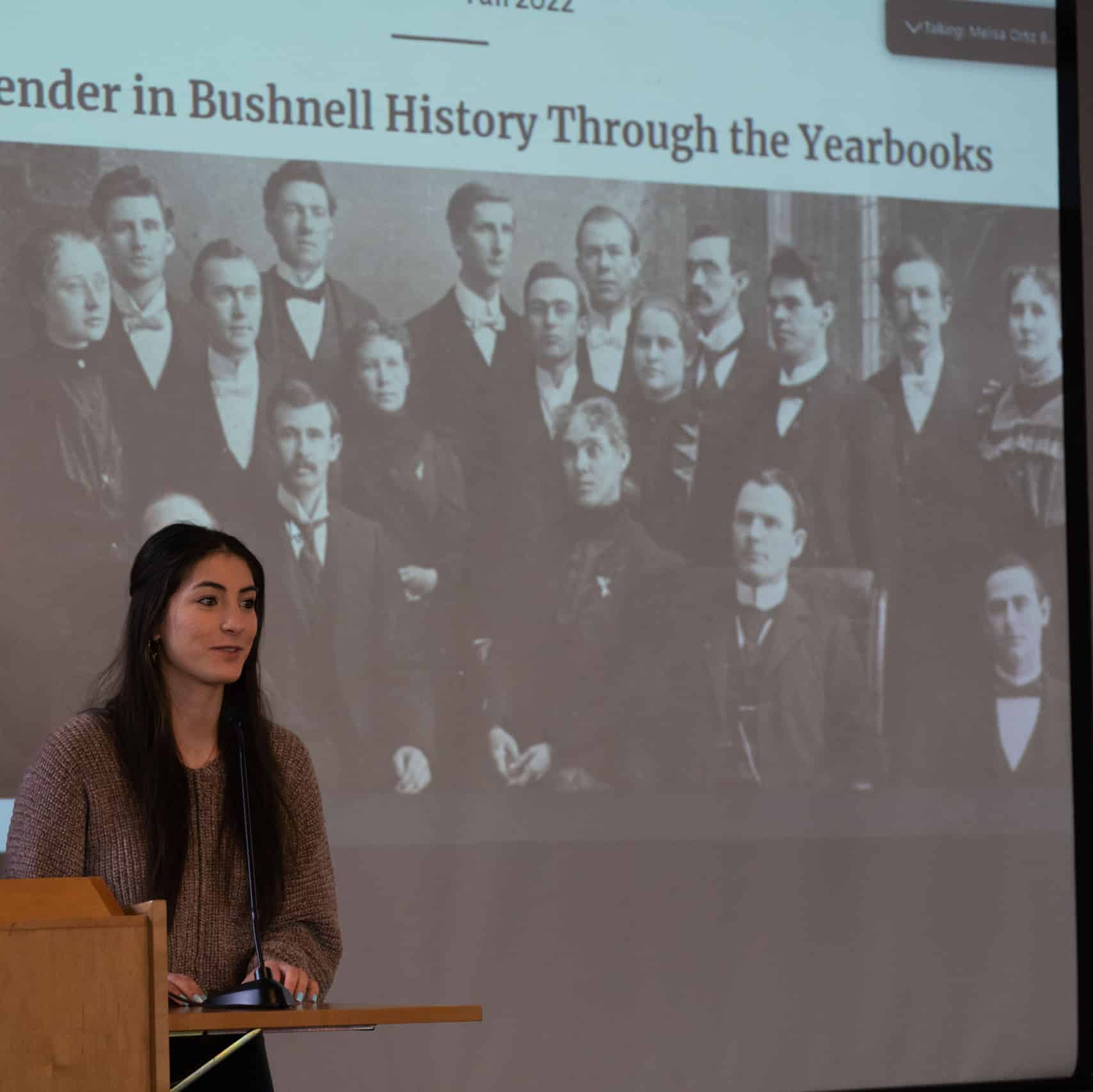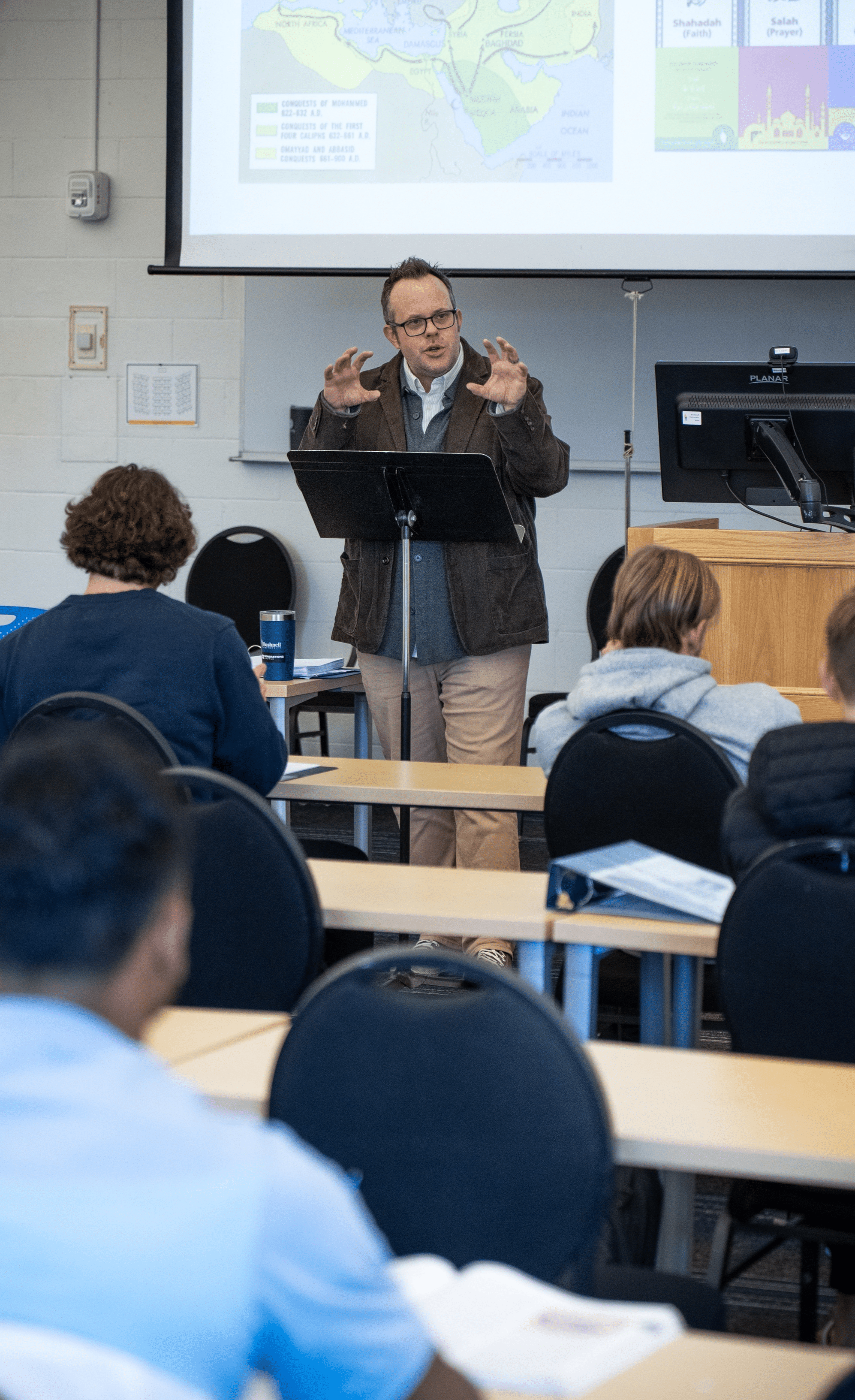History
Major & Minor
 History is an encompassing discipline whose essence is in the understanding of the connectedness of historical events and human experiences. By studying History at Bushnell University, students will examine the causes, contexts, and chronologies of past events, you’ll gain an understanding of the nature of continuity and change in human experiences as well as achieve new insights into contemporary events and issues.
History is an encompassing discipline whose essence is in the understanding of the connectedness of historical events and human experiences. By studying History at Bushnell University, students will examine the causes, contexts, and chronologies of past events, you’ll gain an understanding of the nature of continuity and change in human experiences as well as achieve new insights into contemporary events and issues.
The history major prepares you for a wide variety of career choices such as further education in history, law, business, medicine, and ministry and in all professions that demand the knowledge, understanding, perspective, skills, and sensitivities one gains through studying history.
Contact
Stephen Andes, D.Phil.
Program Director
541-684-7264
sandes@bushnell.edu
Discover More
Why Choose History at Bushnell?
The History major focuses on three areas: US History, World History, and the History of Christianity. Through this program we help students on their journey into a variety of fields such as teaching, law, politics, business, and library science.
Program Objectives
Graduates of this program will:
- Participate knowledgeably in the affairs of the world around them, drawing upon understandings shaped through reading, writing, discussions, and lectures concerning the past
- See themselves and their society from different times and places, displaying a sense of informed perspective and a mature view of human nature
- Read and think critically, write and speak clearly and persuasively, and conduct research effectively
- Exhibit sensitivities to human values in their own and other cultural traditions and, in turn, establish values of their own
- Appreciate their natural and cultural environments
- Respect scientific and technological developments and recognize their impact on humankind
- Understand the connections between history and life
Seeking a Secondary Teaching License
Certification to teach at the secondary level in Oregon is achieved through completing an Initial Teaching License program, such as Bushnell’s Master of Arts in Teaching (MAT) program. The MAT program allows students to earn an initial teaching license plus a graduate degree in one year. For history majors who plan to pursue a career in secondary education, they can apply to the MAT program as completion of their undergraduate degree draws near.
Required Courses
Major Prerequisites
– Choose three credits from:
- History of Western Civilization
- World History
– One year of college-level proficiency in a foreign language
Major Requirements
Area 1 – History of the United States of America
– Choose 9 credits from the following:
- History of the Pacific Northwest
- Women in United States History
- Studies in American History
- Race, Ethnicity, and Gender in American Culture
- History of American International Relations
- Leadership of US Presidents
- Latino Society and Culture in the U.S.
Area 2 – World History
– Choose 9 credits from the following:
- Cultural Geography
- Studies in World History
- History of Africa
- Studies in European History
- Ancient Near East
- Ancient Rome
- History of the Arab-Israeli Conflict
- History of Modern East Asia
- Latin American Civilization
- History of Mathematics
- Survey of Music History
- Hispanic Culture and Civilization
Area 3 – History of Christianity
– Choose 9 credits from the following:
- History of Christianity I
- History of Christianity II
- Studies in Christian History
- Women in the Early Church
- Archeology and the Bible
- Christianity in America
- History and Theology of the Stone-Campbell Movement
- Christianity in Global Perspective
- History of Theology
- History of the Bible
- History of Ancient and Medieval Philosophy
- History of Modern and Contemporary Philosophy
- The Abrahamic Faiths of Judaism, Christianity, and Islam
All Areas
– Telling True Stories: Podcasting Studio
– Internship
– Senior Capstone
Pre-Law Pathway
Bushnell University offers a pathway into the legal profession through its Pre-Law Pathway program. Designed to provide essential skills and personalized guidance, this flexible curriculum prepares you for the challenges of law school and the legal field. You can choose History as your major to pursue pre-law, engaging in core courses such:
- Argumentation and Debate
- Logic and Critical Thinking
- Introduction to Business and Entrepreneurship
- Principles of Accounting I
- Advanced Public Speaking
- Communication and Conflict
To learn more, visit our Pre-Law Pathway webpage.
Beacon Points of Pride
- 100% of traditional undergraduates students graduate with at least 135 hours of field experience
- 190 company and school internship and field experience partners
- The National Board of Certified Counselors (NBCC) reported a 100-percent pass rate for Bushnell students on the national exams (NCE & NCMHE) over the last year. Bushnell students score on average higher than the national averages on 12 of the 14 exam areas
- According to EDsmart.org, a nationally recognized publisher of college resources and rankings, Bushnell University is ranked 2nd in the state of Oregon among fully accredited universities and colleges
Career Opportunities
Careers with a bachelor’s degree in History include:
- Teaching
- Lawyer and legal fields
- Government
- Politics
- Journalism
- Ministry
- Cultural and archival management
- Librarian
- Professor
- National Park Service
- National Archives and Records
- Museums and art galleries
- Historical societies
Internship Sites
- Bushnell University
- Law offices
- Local government
- Libraries
- Schools
Life After Graduation
A sampling of industries our graduates are employed include:
- Education
- Banking
- Law Firm
- Customer Service
- Hospitatility
Program Overview
Life at Bushnell
Visit Campus
Academic Catalog
Hear From Our Students

Meet the Faculty
Stephen Andes, D.Phil. Program Director
“Bushnell University’s history program stands out because we teach you how to think critically and communicate clearly. These attributes, according to Forbes, help those entering the workforce “to differentiate themselves early and…to outperform their more narrowly trained peers over time.” Small classes mean more one-to-one mentoring with faculty. You will be known at Bushnell.
Analysis, research, argumentation, and communication skills—these are the disciplines practiced in the study of history at Bushnell and the tools that will make you successful in the worlds of business, industry, management, law, government, public service, and beyond.”



